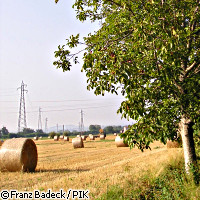Up to one in five German plant species threatened by climate change
As many as one in five German plant species could be lost from certain parts of the country as a result of climate change, according to new research. Even a small increase in temperature and other ecological stresses could be disastrous to some species, the researchers warn. According to the scientists, their findings underline the importance of achieving the EU's target of limiting climate change to a 2°C rise in temperature over pre-industrial levels. The work, which was partly funded by the EU, is published in the journal Biology Letters. The scientists investigated how climate change and changing land use patterns would affect the distribution of 845 European plant species, including 550 which are found in Germany. They found that even with a relatively modest temperature increase of 2.2°C around 7% of species would lose over two thirds of their current range, and with a temperature rise of 2.9°C 11% of species would suffer. When the effects of a temperature rise of 3.8°C were simulated, some 20% of species lost two thirds of their range. The scientists warn that species whose ranges are already small will be most vulnerable to these impacts, and some species could be lost entirely in certain areas. South-western and eastern Germany are likely to be particularly affected adversely. On the other hand, the number of species living in low mountain areas in south-eastern and central Germany is likely to rise, as new species move in. However, the researchers are concerned that climate change may happen too fast for species to move to different areas in response to rising temperatures. 'Many plant species could lose their niches in habitats such as mountains or moors,' commented Sven Pompe of the Helmholtz Centre for Environmental Research in Germany. One of the plants likely to do well in the future is the common walnut (Juglans regia), which could extend into eastern Germany. On the other hand, the marsh marigold (Caltha palustris) may well disappear from some low lying areas of Brandenburg, Saxony-Anhalt and Saxony. EU support for the research came from three projects, namely ALARM ('Assessing large scale environmental risks for biodiversity with tested methods') and ECOCHANGE ('Challenges in assessing and forecasting biodiversity and ecosystem changes in Europe') projects, both of which are financed under the 'Sustainable development, global change and ecosystems' Thematic area of the Sixth Framework Programme (FP6), and MACIS ('Minimisation of and adaptation to climate change impacts on biodiversity'), which is funded under the 'Research for policy support' activity of FP6.
Countries
Germany



